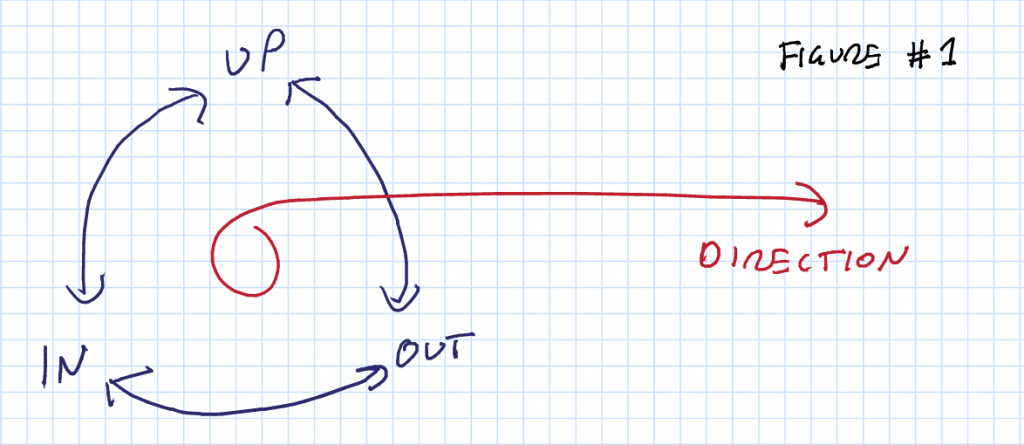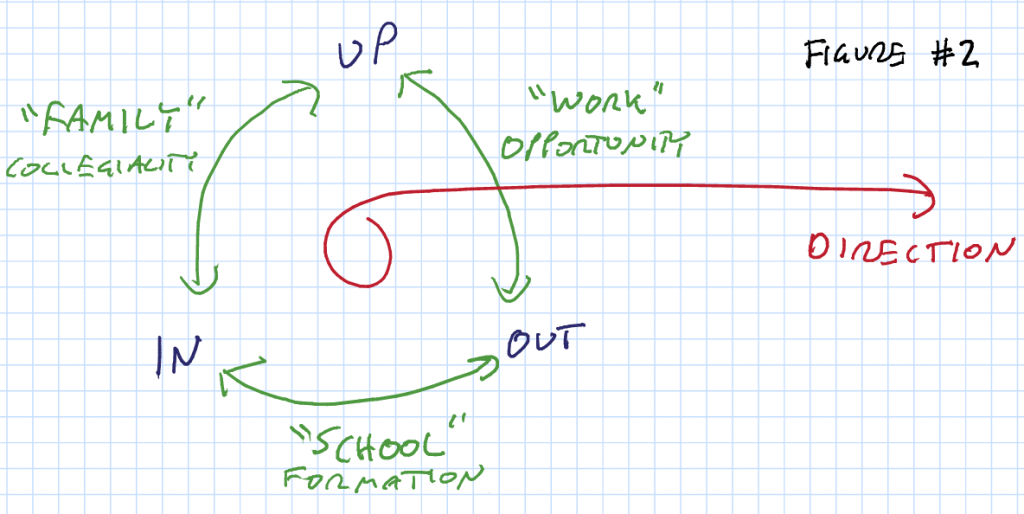Dying to Grow and The Point of It All
 Christmas can be the time substance gets lost beneath frantic frivolities. Pastors, vicars, and ordinary church folk enter into the annual tradition of trying to talk about deep things (incarnation, salvation, Jesus!) without sounding twee or spoiling the mince pies and mulled wine.
Christmas can be the time substance gets lost beneath frantic frivolities. Pastors, vicars, and ordinary church folk enter into the annual tradition of trying to talk about deep things (incarnation, salvation, Jesus!) without sounding twee or spoiling the mince pies and mulled wine.
It’s not just a Christmas predicament, though. The same thing is there, more subtly, throughout the rest of the year. Church life is always full of frantic frivolities. There may be less tinsel, but the dynamic remains. We can lurch from Sunday to Sunday. The buzz of activities can be a pervasive background. Our Christmas “church gigs” have an intensity about them; we invest in them, advertise them, and are glad when we are rewarded with the right sort of numbers. But that only amplifies what is already present: our drive to perform and get growing results. Throughout the year, in the midst of the mist of religious supply and demand, we try to talk about deep things, without sounding twee or spoiling things.
I’m not sure it’s working that well.
I know I have become wary of activity and busyness.
It’s not that I’m into passivity or quietism. I rejoice in the sense of flow when a community acts, seeks, worships together. When brothers and sisters are in unity and purpose… well, the presence of Christ is almost tangible. Even as I write this, I can hear the sounds and smell the smells wafting up the stairs from the meal that is being prepared in our downstairs church hall. It’s an excellent activity with a sense of flow, a weekly expression of hospitality and care, and one of the highlights of my week.
But I also know what it’s like when church activities are not like that: when doing is about duty and not much more, and movement is a going around in circles, a spinning of our wheels. This is when we do things only because we did them last year. This is when new opportunities are met with a pang of cynicism: “We’ve done that, we tried that, that just feels like yet more work.” When we take things deep and try to reconnect with the point of it all, suddenly the words sound hollow, disconnected, echo-like. We drown in the shallows.
When it’s like that, it’s worth listening to Jesus.
Lately I’ve been moved to lay aside all my carefully curated church growth strategies and reflect on the words of Jesus in Matthew 16.
Famously, he has his own church growth church strategy. It is founded on Peter’s confession of Jesus as Lord: “Blessed are you, Simon son of Jonah, for this was not revealed to you by flesh and blood, but by my Father in heaven. And I tell you that you are Peter, and on this rock I will build my church, and the gates of Hades will not overcome it.”
More infamously, Peter tries to take control of this building project. He refuses to countenance the thought of the Messiah laying down his life, and counsels the King of Kings to choose a different path. As Jesus points out, he is moved by “human concerns.” Jesus rebukes him and includes this injunction: “Whoever wants to be my disciple must deny themselves and take up their cross and follow me. For whoever wants to save their life will lose it, but whoever loses their life for me will find it.“
In Luke 17, the same words are echoed. This time, it is not about the foundations of the church, but the finishing touches at the point of our Lord’s return: “It will be just like this on the day the Son of Man is revealed. On that day no one who is on the housetop, with possessions inside, should go down to get them. Likewise, no one in the field should go back for anything. Remember Lot’s wife! Whoever tries to keep their life will lose it, and whoever loses their life will preserve it.”
How’s that for a church growth strategy? Whoever tries to keep their life will lose it!
This has led me to two conclusions:
Firstly, this is a key to our frantic activism, at Christmas time or any time else. So often, we are scrambling to not “lose our life;” we do things to keep from demise. Take any church activity as an example: a Sunday gathering, a carol service, a bible study, an advertising campaign, a diocesan restructure. If it exists as an attempt to justify our existence, prove our relevance, deflect our decline… then we are full of “human concerns” and we are in the way. Often the best thing to do is to cease that activity, or shut something down.
But if those same church activities exist to give ourselves away, for the sake of Jesus… they flow and bring forth life. They become deep, acts of sacrificial worship, reflections of God’s grace, of love to the local community, of sharing our very selves one with another. They encapsulate something precious, the essence of the Kingdom of God.
The same activities can either be a clinging to life (and losing it), or a giving of life for the sake of Christ (and finding it). This is the paradox of Christian leadership towards true church growth: How do you build yourself up by giving yourself away? How do you generate something without slipping into empty activism? My thoughts have taken me here:
Secondly, it lifts our eyes towards the ends, not the means. The big word to describe this is “teleological” – from the Greek word telos meaning “end” or “point” or “goal.” We need to be teleological and look to our end, to the point of it all.
The writer to the Hebrews has the sense of it when he exhorts us to “run with perseverance the race marked out for us, fixing our eyes on Jesus, the pioneer and perfecter of faith” (Hebrews 12:1-12). Paul has a similar motivation when he “sets his eyes upon the prize” (Philippians 3:14). Both speak of activity and perseverance, but the vision is towards the goal. The goal is Jesus.
We need a teleological approach to mission. When we think about mission, we quickly go to the activities (evangelistic activities, community engagement etc.) or desired outcomes (increased attendance, more activity). This is a focus on the means. The Scriptures look first to Jesus.
In Hebrews 2 or 1 Corinthians 15, for instance, we see the goal, the telos, of mission. It is not, firstly, about church numbers, or even social justice, it is about the glorification of Jesus. Everything flows from that. “He must reign until he has put all his enemies under his feet,” Paul says. Psalm 8 is used in Hebrews 2 to say much the same thing about a “Son of Man” who is “made a little a lower than the angels” only to be “crowned with glory and honour” with “everything under his feet.” We find justice, we find salvation, we find grace in that truth, and nowhere else.
This gives the focus of mission. The point of mission is the rule of Christ, the honour of Christ, the glorification of Jesus. True worship is mission. True mission is worship. This is the point. This is the goal. This is our telos. If we don’t do it in the name of Jesus, we will end up doing it in the name of ourselves; we will end up clinging to our life, and so losing it.
For sure, those mission activities are not a waste. Delve into Hebrews 2 and you will see them find their place in the light of Christ’s supremacy: Jesus is glorified when his people glorify him. This happens when his people are sanctified and set free from the power of sin and death. Therefore, evangelism and outreach are a means of our mission. Pastoral care and discipleship activities are a means of our mission. Confession and repentance and contrition are a means of our mission. But they are, by definition, not an end in and of themselves. But be aware, we can do all these things in a self-facing frantic way, and so lose ourselves.
Our diocese happens to face an uncertain 2020. It’s not alone; the pressure to perform, and survive, and to save ourselves is mounting on the declining Western church. We can cling to ourselves, or we can “lose ourselves” in the truth of Jesus, reigning over all things. We give ourselves to him. We trust him. We repent. We worship. We adore. We devote. We give ourselves to that end. We give ourselves to that goal. We give ourselves and so find ourselves… in Jesus, our Lord.
Merry Christmas.





